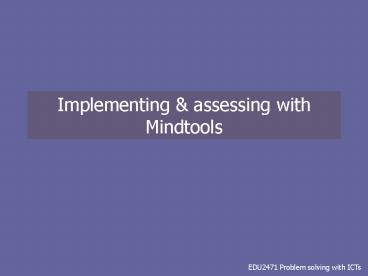Implementing - PowerPoint PPT Presentation
1 / 14
Title:
Implementing
Description:
Assessing critical thinking. Critical thinking is context-dependent ... Critical thinking skills are stabel. Changes will require time and multiple uses of mindtools ... – PowerPoint PPT presentation
Number of Views:22
Avg rating:3.0/5.0
Title: Implementing
1
Implementing assessing with Mindtools
2
Objectives
- Discuss roles of learners in working with
mindtools - Consider challenges to teachers of working with
mindtools - Discuss some issues in assessing learning with
mindtools
3
Constructive roles for learners
- Why do learners not achieve their potential?
- Limited repertoire of learning strategies
- Poor motivation lowered expectations
- Reliance on simple solutions rather than
effortful reasoning - Learners need to
- Approach learning mindfully
- Regulate intentional processes for learning
- Mindtools can help
4
Mindful learning
- Mindfulness is required for meaningful learning
- Characterised by
- Suppressing initial responses
- Gathering examining information
- Connecting to existing knowledge
- Concentrated effort
- Reflection
- Mindtools support mindfulness but it depends upon
learner willingness interest
5
Self-regulated learners
- Learners should be active not passive
- Determine goals, plan prepare
- Engage in monitor learning
- Maintain motivation purpose
- Key to self-regulation is intentionality
- Deciding to learn
- Articulate goals and reflect on achievement
6
Challenges to teachers
- Learners are not mindful self-regulated because
that has not been required - Teaching has been viewed as telling
- Mindful and self-regulated learning is different
- Teachers are challenged to work differently
7
General
- Philosophy
- Mindtools assume a constructivist approach
- Project or problem based
- Centred on learner rather than teacher
- Authority
- Teachers need to relinquish some authority
- Power-related intellectual
- It is not necessary to know everything
- Accept different perspectives interpretations
- Assist learners to create meaning
8
Skills
- Technology skills
- Need to be able to use mindtools
- Need to be able to model, coach scaffold
learning - Teaching skills
- Change
- From provider of knowledge
- To instigator, promoter, coach, guide, model
- Asking questions rather than giving answers
- Watching learners struggle
9
Support
- Administrative support
- School culture needs to be receptive to changes
- Engagement is difficult in short classes
- Technology support
- Need access to computers software
- Computer per 3 to 4 learners
- Parental understanding support
- Parents may resist changes
- Need to explain and demonstrate learner
achievement
10
Assessment issues with Mindtools
- Teaching learning are driven by assessment
- Do tests assignments match stated goals?
- If mindtools are to engage complex thinking
- Assessment much match those outcomes
- Traditional assessment
- Decontextualises learning
- Favours reproductive learning outcomes
- Makes evaluation artificial stressful
- Mindtools products should have relevant evidence
- Use multiple mindtools opportunities
11
Assessing knowledge construction
- Important to assess kind extent of knowledge
construction - Not regurgitation of ideas
- Intellectual performance is highly personalised
- Learners constructions of meaning will vary
- Encourage self-assessment first
12
Assessing self-regulation
- Assessment is not for judging learners
- Enable learners to direct own learning
- Self-assessment is key to self-regulation of
learning - Mindtools assessment should support
self-assessment
13
Assessing collaboration
- Collaborative use increases mindtools
effectiveness - Collaborative use does not match individual
assessment - Collaborative assessment is more authentic for
such use
14
Assessing critical thinking
- Critical thinking is context-dependent
- Assess mindtool products in context of use
- Critical thinking skills are stabel
- Changes will require time and multiple uses of
mindtools































